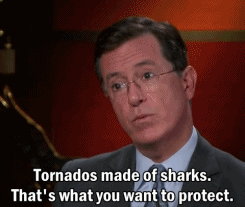In a decade or two (~1995–2010), an unusual transformation occurred in the perception of sharks.
In the society, sharks went from being feared animals to protected and even totemic animals. In the shark-enthusiast community, the combination of interest or mild obsessions with sharks, the desire to do something and protect sharks, and mysticism, resulted in sharks becoming totemic animals. Even for some in the field of ichthyology, sharks ceased to be “fishes” and became totemic animals...
Shark Biology Becomes Shark Advocacy
When sharks ceased to be “fishes” and became “totemic animals,” much of shark biology evolved into advocacy.
Although there were sufficient scientific, ecological, and economic reasons to protect sharks, a totemic relationship requires that the totem be protected and be a protector of the clan. Thus, it was necessary, in the advocates’ view, to dispel “the myths created by Jaws,” or the idea that sharks are, or could be, man-eaters.
The notion of sharks as man-eaters was not compatible with the relation-ship desired with the totemic animal. Furthermore, if sharks were man- eaters, or potential man-eaters, they would not be tolerated and could not be protected in a society where most people are not aware of the differences among domesticated, tamed, and wild animals. So, in the advocates view, totemic sharks could not be man-eaters. Thus, a change in perception was needed, and sharks had to be portrayed as harmless to humans...
Shark Television
The movie Jaws also engendered a new television genre.
In 1988, the public fascination, or obsession, with sharks caused by the movie led the “Discovery Channel” to produce “Shark Week,” a week-long series of programs based on sharks. The shows were instantly successful. In time, “Shark Week ” would become the longest-running program on cable television, having lasted 28 years as of 2016.
In the early years, the shows were loosely based on natural history or conservation of sharks and were fairly realistic. Perhaps catering to what was attractive to the audience, programs soon became centered on white sharks or bull sharks, Carcharhinus leucas , and their attacks on people...
As satellite tags were developed and became widely used, filmmakers turned to shark tagging to replace the superannuated shark attack programs.
The tagging of a large shark is always an exciting event and could produce the action footage that the networks loved. Because of the high cost of satellite tags, film producers could always find a willing researcher lacking funds or seeking publicity, although most of the time the “researchers” were usually unknown to those actually studying sharks. The “researcher” could assume heroic poses in the tagging film, which could be finished with the perennial “high fives” of such films.
The networks loved it!
And then, there's this.
Like any passionate shark lover, I once adored shark flicks.
The brave scientist pressing into the unknown, the cool gadgets, the thrashing of a hippo-sized toothy fish from the deep that quickly returns from whence it came – this is the stuff of obsession for any nerdy 11-year-old kid.
But today, most of these movies make me want to wretch.
It’s not just the puffy-chest posing and the gravely-voiced narrators, it’s the whole vibe. Sharks on Shark Week aren’t really animals anymore, they’re props. And increasingly the stars aren’t scientists, they’re stuntmen like Dickie Chivell, who gets on surfboard-like things to see if he can tempt a white shark to bite him or Micheal Phelps, who … I honestly don’t know what the hell that guy has to do with sharks.
This isn’t David Attenborough, this is Jackass. Danger porn.
Proponents of Shark Week claim that the program helps bring awareness to sharks and promotes conservation. But let’s get real, no one walks away from Shark Week saying, “Wow, I really want to donate to conservation efforts.”
Twenty-nine million people tune in to Shark Week with an average of 2 million per episode and yet no conservation NGO I know of sees a bump in donations. If anything, shark populations have plummeted during the 27 years Shark Week has been on the air.
Bingo.
Before watching Shark Week, you should really read this splendid tour de force about bullshit Shark science and researchers, bullshit Shark conservation and bullshit Shark movies by the venerable José Castro; and check out this little pearl by Eric Vance.
And then, by all means, feel free to go ahead and watch that shit as it is utterly irrelevant anyway.
And then, by all means, feel free to go ahead and watch that shit as it is utterly irrelevant anyway.
Enjoy.
The articles and the stupid Shark shows!





2 comments:
Shark week has absolutley zero bearing on shark conservation, whether "good" or "bad". It is just another schedule filler.
I have never heard anyone mention Shark Week in any RFMO meeting, when developing any conservation policy or fisheries management measures. I've never even heard it spoken about by divers who come on trips to specifically see sharks up close and personal.
I have never heard any funders mention anything about it.
The only time I have ever had Shark Week specifically spoken about was about 2-3 years ago, when some NGOs had a virtual conference call with Discovery Channel bods. The only thing that was discussed in any detail - promoting Shark Week via organisation's various Twitter feeds.
The only researchers who pay it any attention, seem to be the ones who crave attention, and not jst about their research.
Hear hear!
The only researchers who pay it any attention, seem to be the ones who crave attention, and not just about their research.
No yer wrong there - it's ZERO about research and ALL about craving attention!
Post a Comment